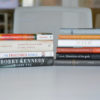Each December I post for you my favorite reads of the past year. This is not a “working list,” so I try as best I can to avoid theological or “ministry” books (though this year there were a few unavoidable exceptions). I don’t claim that these are necessarily the “best” books of the year, just that they are books that I both enjoyed and that made me think. Often I can see that visibly by the number of book flags protruding from the pages, marking passages I will want to ponder again. These books carried such flags like a United Nations building. The books are in no particular order other than where I found them on the shelf as I was writing this.
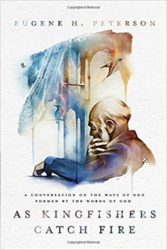 1) Eugene H. Peterson, As Kingfishers Catch Fire: A Conversation on the Ways of God Formed by the Words of God (Waterbrook)
1) Eugene H. Peterson, As Kingfishers Catch Fire: A Conversation on the Ways of God Formed by the Words of God (Waterbrook)
Some of you will want to pass this book by when you see that it is a collection of sermons. Don’t. This is, in my view, Peterson’s best book, in his long lifetime of writing good books. Peterson is at his best when forcing the reader to confront old truths from a different, sometimes jarring, perspective. His discussion, for instance, on the Beatitudes calls the reader to consider that nobody in the ancient world expected to be happy. Tragedy was the defining feature of life. If one was happy, one wished to hide that fact, for fear that the gods would punish one for acting like one of them. Into that world, God brought the idea of blessing—an idea both at odds with ancient tragedy and with modern emotional entitlement.
Peterson is an artisanal metaphor-maker, with images that will stay with you for years. My favorite is his discussion of vulnerability in terms of skeletal structure. Peterson notes that creatures with exoskeletons (crabs and beetles) are advantaged at first, protected from the outside world. We creatures with skeletons on the inside are much more vulnerable to harm at first (think of a baby or a kitten). The beetle loses his advantage because while it survives, it doesn’t develop. Vulnerable creatures are less likely at first to survive, but, if they do, they develop far beyond their protected counterparts. As Jesus would say, “Therein is a parable.”
My favorite passage is from where Peterson expresses how fed up he is with Jane Austen’s Emma, for the unsatisfactory choices the character is making: “Just as I get thoroughly fed up at times with God’s Eugene. God created me and inserted me as a character in the story of salvation. Sometimes I don’t like the position I have in the plot. I don’t like what I do and say. I don’t like what other people do and say to me. I don’t like the way things are going at all, and I get angry with the author. ‘If you are writing a story of salvation, surely you can make it more satisfactory than this!’ And then I get interrupted by Isaiah 35.”
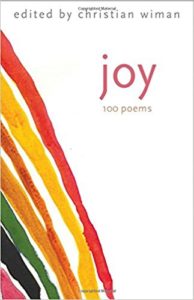 2) Christian Wiman, Joy: 100 Poems (Yale University Press)
2) Christian Wiman, Joy: 100 Poems (Yale University Press)
Like Peterson’s example of “blessing,” joy is a word we don’t easily understand in our context, conflating it with the sort of perpetual emotional exuberance to which we believe we are entitled. C.S. Lewis, of course, defined joy in a way that is more akin to longing than to whatever we define as “happiness.” This collection of poems takes up the challenge of picturing such joy to us in lyrical form. The poems are well chosen, many of them haunting. The best part of the book, though, is Wiman’s introduction. He notes how strange joy seems in a world filled with suffering, a strangeness no less true for “those early audiences of Paul and others, many of whom might very well have made their way home past rows of crucified corpses designed specifically to eradicate all cause for any insurrectionist hope or joy.”
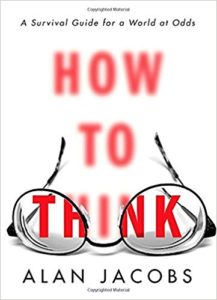 3) Alan Jacobs, How to Think: A Survival Guide for a World at Odds (Currency)
3) Alan Jacobs, How to Think: A Survival Guide for a World at Odds (Currency)
In an incredibly stupid time, this book is a balm. Jacobs here interacts with thinkers from George Orwell to Jonathan Haidt, showing us just why we choose tribal identity and hack rhetoric over genuine thinking. Along the way, he shows that much of our unthinking hostility toward one another is not first of all about contested facts, but about a longing for membership, for inclusion in what C.S. Lewis calls “the Inner Ring.”
After reading this book, you will notice the pull to herd over thought, not only on social media and on the competing news sites you check each morning, but also in your own soul. As he puts it, the diagnosis is, in many ways, the cure.
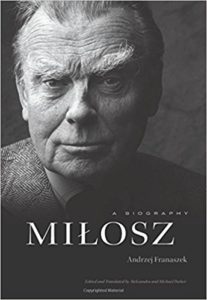 4) Andrzeg Franaszek, Milosz: A Biography (Harvard University Press) and Czeslaw Milosz, The Mountains of Parnassus: A Novel, trans. Stanley Bill (Yale University Press)
4) Andrzeg Franaszek, Milosz: A Biography (Harvard University Press) and Czeslaw Milosz, The Mountains of Parnassus: A Novel, trans. Stanley Bill (Yale University Press)
One who yielded, briefly, to the temptation of the Inner Ring was the Lithuanian poet Czeslaw Milosz, who then spent the rest of his life defying that temptation. The biography traces the poet’s life from World War I era Eastern Europe through the Nazi invasion of Poland, his life as a would-be diplomat, and finally as a poet who gets at, in my view, what it means to be a creature better than almost any of his contemporaries.
Along with this exceptional biography, Milosz himself had a book published posthumously, this one a kind of, for lack of a better word, science fiction. I expected this to be the sort of failure that happens whenever one attempts to go “outside of one’s lane.” That was my ignorance, believing somehow that the poet and essayist would, by imagining a futuristic reality, be going, in fact, outside of his lane. This is the same lane—exploring the aridity of modernity and the pull toward religious transcendence.
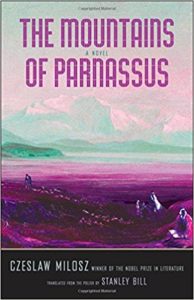 My favorite passage: “When an individual is delighted neither by reasons of state nor by the rhetoric of social norms, he will find meager consolation in a choice between lessons in civil morality and the Church as a troop of boy scouts trained in an additional politeness useful to the authorities.”
My favorite passage: “When an individual is delighted neither by reasons of state nor by the rhetoric of social norms, he will find meager consolation in a choice between lessons in civil morality and the Church as a troop of boy scouts trained in an additional politeness useful to the authorities.”
Or, as quoted by his biographer, Milosz wrote: “Whoever considers as normal the order of things in which the strong triumph, and the weak fail, and life ends with death, accepts the devil’s rule.” I suppose that’s why I love Milosz. He grappled with God sometimes, but he always seemed to know that the devil was there, and what he was up to.
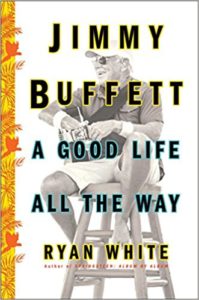 5) Ryan White, Jimmy Buffett: A Good Life All the Way (Touchstone)
5) Ryan White, Jimmy Buffett: A Good Life All the Way (Touchstone)
People assume that, were they to examine my music library on my phone, they would find Johnny Cash at the top of the most listened to category. I just checked it and it is, actually, Jimmy Buffett. This would surprise those who only know Buffett from “Margaritaville.” He actually, though, is one of the best songwriters in recent memory. Listen, for example, to “Death of an Unpopular Poet” or “He Went to Paris” or “A Pirate Looks at Forty.” This biography traces how this songwriter made it when he shouldn’t have, given the fact that he didn’t fit into any of the marketable categories defined by country or rock radio. The breaking point came when a record company executive noticed at a concert that everyone was singing along with Buffett’s songs, even though they were not on the radio.
The book is a fun read not only because it is brilliantly written, often with laugh-out-loud anecdotes and quotes, but also, and primarily, because it’s about, well, Jimmy Buffett. As White points out, Buffett sings about the search for self, about the inevitability of death, about broken love, but always with a positivity that seems to think everything is going to work out. At one point, White notes a colleague saying, “Jimmy seems to be adjusting to his own lyrics.”
Don’t we all?
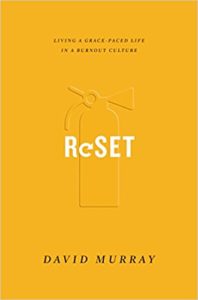 6) David Murray, Reset: Living a Grace-Paced Life in a Burnout Culture (Crossway)
6) David Murray, Reset: Living a Grace-Paced Life in a Burnout Culture (Crossway)
I end 2017 feeling like a born-again Jimmy Buffett, hopeful and brimming with joy. I started 2017, though, feeling like Hank Williams in the back of a Cadillac somewhere in West Virginia. My tiredness was due to other factors than those that did in Williams, but was real nonetheless. Maybe I will write about that sometime, but not today. My friend Justin Taylor sent me this book in its pre-publication galleys, and it changed things for me. The book showed me how close I might be coming to burning out because of my frenetic activity, but it didn’t stop there. Murray gave me here multiple practical tools to manage my schedule, to say “no” to things. God used this book to give me permission to rest, to think, and to live. I can’t calculate how many times I’ve recommended this book this year to tired, overscheduled Christians. I recommend it again now, to you.
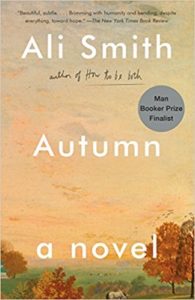 7) Ali Smith, Autumn: A Novel (Anchor)
7) Ali Smith, Autumn: A Novel (Anchor)
I’m actually not finished with this book yet, but I know already that it will be among the most thought-provoking of the year for me. This novel, set in the turbulent time of the Brexit-era United Kingdom, is fascinating not so much for its story as for its mood. Many reviewers suggested that this book, a finalist for the Man Booker Prize, captured something of the autumnal spirit. I agree. That’s the case not only in the “seasons of life” of the characters, featuring a millennial’s friendship with a 100-year-old man, but also in something harder to explain. Questions are raised in this book that the book itself can’t, or doesn’t try to, answer, about the mysteries of human life and meaning, and Smith does so beautifully.
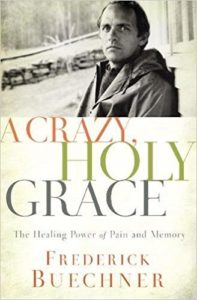 8) Frederick Buechner, A Crazy, Holy Grace: The Healing Power of Pain and Memory (Zondervan)
8) Frederick Buechner, A Crazy, Holy Grace: The Healing Power of Pain and Memory (Zondervan)
When I saw this new work from Buechner, now over 90 years old, I immediately texted my friend songwriter/author Andrew Peterson who, like me, was influenced strongly by Buechner, to trumpet the news. We both thought that we had all the Buechner we would ever have, and here would be more. Immediately, though, I wondered whether this would be disappointing. “Maybe he’s past his prime,” I told Andrew, “But no one wants to tell him that.” My fears were baseless. Buechner was back, and without missing anything of his old power.
The essays here are, mostly, from previous writings or from unpublished lectures. They are woven together into an engrossing reflection on the beauty that can come out of pain. Buechner deals here with the raw emotion of a child losing his father to suicide. Buechner reflects that someone said to him, “You’ve been a good steward of your pain.” This book is an exercise in just such stewardship. “Blessed are those who mourn,” Jesus taught us. This book can help you find that blessing, whether you are suffering now or whether you love someone who is or whether you are just building on a rock somewhere, preparing for a storm to come.
My favorite passage is from where Buechner is asked by his mother whether he believes in life after death: “I said that if the victims and the victimizers, the wise and the foolish, the good-hearted and the heartless all end up alike in the grave and that is the end of it, then life would be a black comedy, and to me, even at its worst, life doesn’t feel like a black comedy. It feels like a mystery. It feels as though, at the innermost heart of it, there is Holiness, and that we experience all the horrors that go on both around us and within as horrors rather than as just the way the cookie crumbles because, in our own innermost hearts, we belong to Holiness, which they are a tragic departure from. And lastly, I wrote her, I believe that what happens to us after we die is that we aren’t dead forever because Jesus said so.”
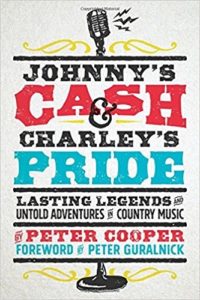 9) Peter Cooper, Johnny’s Cash, Charley’s Pride: Lasting Legends and Untold Adventures in Country Music (Spring House Press)
9) Peter Cooper, Johnny’s Cash, Charley’s Pride: Lasting Legends and Untold Adventures in Country Music (Spring House Press)
This book, by music journalist Peter Cooper, is, without doubt, the laugh-out-loud funniest thing I’ve read all year. The book pulls back the veil on the Nashville music industry with a series of profiles on artists ranging from Kris Kristofferson to Merle Haggard to Loretta Lynn and beyond. Even if you don’t like country music at all, you will like this book for what it tells you about the human personality and the drive to create.
My favorite passage might be on why Johnny Cash is unique: “If you sing like Haggard, you are a traditionalist. But if you sing like Cash, you are just doing a Johnny Cash impression. You might as well do Richard Nixon saying ‘I am not a crook,’ or do Marlon Brando doing the Godfather. You might entertain, but your entertaining will be based in replication, not in creation. And so, other than Johnny’s brother, Tommy Cash, no hitmaking country singer has emerged who sounds even remotely like Johnny Cash. There’s really no point.”
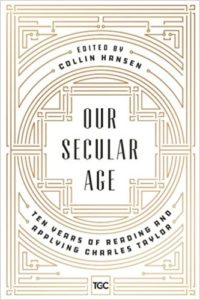 10) Collin Hansen, ed., Our Secular Age: Ten Years of Reading and Applying Charles Taylor (The Gospel Coalition)
10) Collin Hansen, ed., Our Secular Age: Ten Years of Reading and Applying Charles Taylor (The Gospel Coalition)
Charles Taylor’s A Secular Age is a signpost to what is happening all around us right now, as the plausibility of Christianity (or, at least, of the institutions of religion) seems to wane all across North America and Western Europe. This short collection of essays examines Taylor’s thesis from a Reformed evangelical Christian perspective. The opening essay by the Gospel Coalition’s Collin Hansen engages neither in Pollyannaish denial nor in a panicked siege mentality. “The key theological question for our secular age, then, is this: Does God get to be God?” Hansen writes. “The answer, even for many self-described Christians is, ‘No, only on our terms.’”
Perhaps my favorite essay in this volume is by Derek Rishmawy, one of the brightest lights of young evangelical academics. Rishmawy insightfully correlates technology with generational cultural moves: “Indeed, millennials’ greater aptitude for technology has also helped shift the locus of authority from age to youth—kids teach their grandparents to use gear they navigate as second-nature. The older need the younger more than the younger believe they need the older.”
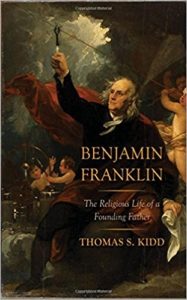 11) Thomas S. Kidd, Benjamin Franklin: The Religious Life of a Founding Father (Yale University Press)
11) Thomas S. Kidd, Benjamin Franklin: The Religious Life of a Founding Father (Yale University Press)
I’ve long said that the cultural Christianity around us often resembles the religion of Benjamin Franklin rather than that of his friend and contemporary George Whitefield. This book explores Franklin’s complicated religion, one that, with its rejection of personal regeneration and its acceptance of a providential role for the United States, came in many ways to dominate the civil religion we can see all around us. Kidd’s work succeeds no matter what he writes about because he combines rigorous scholarship with an almost novelistic writing-style that can speak to the imagination as well as to the intellect.
My favorite passage is the closing one, as Kidd portrays a dying Franklin in a room with a painting of the Matthew 25 scene of Jesus dividing the sheep from the goats at his Judgment Seat: “What was going on in Franklin’s mind, as he gazed at God separating the saved and the damned? To the end, Franklin’s faith was enigmatic. It was clear that by the end of his life, he affirmed God’s Providence, and God’s future rewards and punishments. But after a lifetime of questions…doubts still lingered. He had sought to live by a code of Christian ethics. But had he fully lived up to them? The doctor believed that those who enter heaven must do so by their virtue. But he knew that the Calvinist questioners saw this as false hope. No one merited salvation by their goodness, they said. They thought Franklin was wrong. He thought they were wrong. And so, Franklin waited, with ragged breathing, eyes fixed on the painting.”
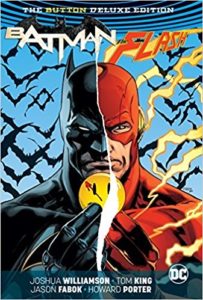 12) Joshua Williamson, Tom, King, Jason Fabok, Howard Porter, Batman/The Flash: The Button (DC Comics)
12) Joshua Williamson, Tom, King, Jason Fabok, Howard Porter, Batman/The Flash: The Button (DC Comics)
The venerable old publisher of Superman and Wonder Woman has revitalized itself with the successful Rebirth initiative, which returned key aspects of the DC universe’s legacy. This means a renewed focus on, of all things, hope and love and even family. The key mystery behind the rebirth is the fact that something, or someone, has been messing with the time-stream. The amazingly well-done Rebirth one-shot, by Geoff Johns and Gary Frank, set the groundwork for the years to come with a surprise ending, of Batman finding on his cave wall the bloody smiley-face button of the Comedian, the iconic symbol of Alan Moore’s Watchmen series from the 1980s. The story-behind-the-story is set for Johns’ and Frank’s Doomsday Clock twelve-issue series, which just debuted this month.
The Button collection set the stage for Doomsday Clock with a story of Bruce Wayne (Batman) and Barry Allen (the Flash) investigating the source behind this strange-acting button. The result is a fun roller coaster of narrative, resolving some rebirth issues but leaving many more to be answered later. With that, though, comes a deeper theme of the rebirth initiative, which is focused often on fathers and their children. Bruce Wayne encounters, in a separate time-stream, the father who was murdered when he was a child. Thomas Wayne tells his son not to follow the path on which he’s set out, that of a dark knight avenging the deaths of his parents. The conflict evident when the bat-clad billionaire hesitates when he sees the bat-signal in the sky above Gotham hits at an important question: how much of who we are is tied up in our backgrounds and in our parents’ expectations of us?





